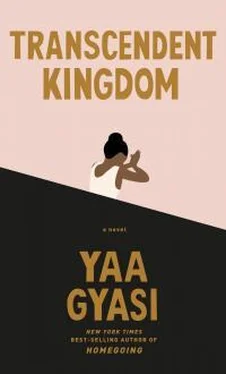Even when I was a child, this miracle had seemed like a stretch to me, too miraculous an event in a book filled with miraculous events. David and Goliath, Daniel and the lion’s den, even Jonah and the whale, had seemed plausible, but Lazarus, four days dead, then beckoned back to life with one “Come forth” from Jesus, seemed like a step too far.
The problem for me then wasn’t that I didn’t believe that Jesus could do it. It was that I didn’t understand why he would. I’d spent every Easter of my childhood in a pastel-colored dress and white patent-leather shoes, scream-singing “He is ri-i-i-sen, HE IS RI-I-I-SEN, AND HE LIVES FOREVERMORE,” celebrating with relish the resurrection of a man whom death could not conquer. And so what to make of Lazarus’s coming forth? Why would Jesus steal his own thunder in that way, and why did we not sing songs for Lazarus, the man who God thought deserved to live again?
“Our friend Lazarus sleeps, but I go that I may wake him up,” I read, but my mother didn’t stir. I put the Bible away and went back into the kitchen to put a pot of tea on. Thinking about Lazarus has always led me to think about what it means to be alive, what it means to participate in the world, to be awake. When I was a child, I wondered how long Lazarus lived after he died. Was he still among us now? An ancient, a vampire, the last remaining miracle? I wanted an entire book of the Bible to be devoted to him and to how he must have felt to be the recipient of God’s strange and amazing grace. I wondered if he was the same man he was before he cheated death or if he was forever changed, and I wondered how long forever was to a man who had once been asleep.
Looking back, I could see that I was so easily psychoanalyzable. I stirred my tea, thought about Katherine, thought about Lazarus, and played therapist to myself, recognizing the cliché of picking the book of John, picking Lazarus, for that particular moment in my life.
“Do you believe in the Gospel of Jesus Christ as evidenced by the Holy Spirit?” I asked myself, laughing alone in my kitchen. I didn’t bother answering.
—
In Philosophical Foundations of Neuroscience, Bennett and Hacker write:
What [neuroscience] cannot do is replace the wide range of ordinary psychological explanations of human activities in terms of reasons, intentions, purposes, goals, values, rules and conventions by neurological explanations…For it makes no sense to ascribe such psychological attributes to anything less than the animal as a whole. It is the animal that perceives, not parts of its brain, and it is human beings who think and reason, not their brains. The brain and its activities make it possible for us —not for it —to perceive and think, to feel emotions, and to form and pursue projects.
While there were many “philosophy and the mind” or “philosophy and psychology” courses offered when I was an undergrad, there were few philosophy and neuroscience courses to be found. Bennett and Hacker’s book was recommended to me my junior year by a TA named Fred who had once called me “unnerving and untraditional,” which I took to mean that he thought I asked too many of the wrong kinds of questions. I’m fairly certain he gave me the book to get me out of his office hours, if not forever, then at least for the length of time it would take me to read it. I had never thought of my scientific questions, my religious questions, as philosophical questions, but nonetheless, I went back to my dorm’s common room, opened the book, and read until I was bleary-eyed and exhausted. I was back in Fred’s office the next week.
“I know that psychology and neuroscience have to work in concert if we want to address the full range of human behavior, and I really do love the idea of the whole animal, but I guess my question is that if the brain can’t account for things like reason and emotion, then what can? If the brain makes it possible for ‘us’ to feel and think, then what is ‘us’? Do you believe in souls?” I was breathless. Fred’s office was a long walk from my last class, and I had jogged there to try to catch him before he left for lunch.
“Gifty, I actually haven’t read the book. I just thought you might like it.”
“Oh,” I said.
“I’ll give it a read if you want to talk about it with me, though,” he said.
“That’s all right,” I said, inching away. “Do you want the door open or closed?”
I took the long way home from Fred’s office, wondering if it was too late to change my mind and become a doctor. At least then I could look at the body and see a body, look at a brain and see a brain, not a mystery that can never be solved, not an “us” that can never be explained. All of my years of Christianity, of considering the heart, the soul, and the mind with which Scripture tells us to love the Lord, had primed me to believe in the great mystery of our existence, but the closer I tried to get to uncovering it, the further away the objects moved. The fact that I can locate the part of the brain where memory is stored only answers questions of where and perhaps even how. It does little to answer the why. I was always, I am ever, unnerved.
—
This is something I would never say in a lecture or a presentation or, God forbid, a paper, but, at a certain point, science fails. Questions become guesses become philosophical ideas about how something should probably, maybe, be. I grew up around people who were distrustful of science, who thought of it as a cunning trick to rob them of their faith, and I have been educated around scientists and laypeople alike who talk about religion as though it were a comfort blanket for the dumb and the weak, a way to extol the virtues of a God more improbable than our own human existence. But this tension, this idea that one must necessarily choose between science and religion, is false. I used to see the world through a God lens, and when that lens clouded, I turned to science. Both became, for me, valuable ways of seeing, but ultimately both have failed to fully satisfy in their aim: to make clear, to make meaning.
“You’re not serious,” Anne said that day in Integrated Science when I revealed my former Jesus freak. She’d spent our entire friendship performing a kind of evangelism of her own, trying to disabuse me of my faith. I didn’t need her help; I’d been doing that work on my own for years.
“Do you believe in evolution?” she asked one sunny spring day. We had dragged a couple of picnic blankets out onto the lawn so that we could study in the sunshine. It was among the happiest times of my life. And though we argued all the time and though we wouldn’t stay friends for much longer, she knew me better than anyone had ever known me. Even my mother, flesh of my flesh, had never really seen me the way Anne saw me. Only Nana had known me better.
“Of course I believe in evolution,” I said.
“Okay, but how can you believe in evolution and also believe in God? Creationism and evolution are diametrically opposed.”
I plucked a weed from the grass at the edge of the blanket and started to crush its petals in my hand, smearing my fingers with yellow pigment, then presenting that color to Anne as though it were a gift. “I think we’re made out of stardust and God made the stars,” I said. I blew and yellow dust flew into the air, into Anne’s hair, and she looked at me like I was crazy, and she saw me.
—
I don’t know why Jesus would raise Lazarus from the dead, but I also don’t know why some mice stop pressing the lever and other mice don’t. This may be a false equivalence, but they are two questions that have emerged from my one, unique mind at one point in my life or another, and so they are two questions that have value to me.
Читать дальше












